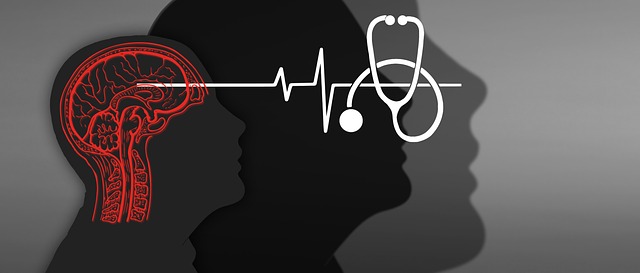In today's diverse healthcare landscape, particularly within Highlands Ranch communities, cultural competency is essential for high-quality patient care. As demonstrated by Highlands Ranch Child Abuse Therapy, understanding and navigating different cultural contexts leads to better outcomes. By recognizing patients' unique values, beliefs, and traditions, healthcare providers can foster empathy, improve communication, and tailor treatments. Training in cultural competency helps overcome biases, ensuring accurate assessments and personalized care for diverse patients. The success of Highlands Ranch Child Abuse Therapy lies in its tailored mood management practices, rooted in robust cultural sensitivity training. Effective programs should include interactive scenarios, role-playing, and cultural simulations to enhance understanding and reduce provider burnout. Evaluating initiatives through surveys, focus groups, quantitative metrics (like patient satisfaction and healthcare disparities), and burnout rates ensures their positive impact on diverse communities over time.
In today’s diverse healthcare landscape, cultural competency training is no longer an option—it’s an imperative. Understanding and respecting patient backgrounds, beliefs, and behaviors is crucial for delivering effective, empathetic care. This article explores these essential topics: from the impact of cultural biases and stereotypes to a case study on successful cultural sensitivity practices at Highlands Ranch Child Abuse Therapy. We’ll delve into designing effective training programs and measuring their success, offering insights to enhance healthcare delivery for all.
- Understanding Cultural Competency in Healthcare: A Necessity in Modern Practice
- The Impact of Cultural Biases and Stereotypes on Patient Care
- Highlands Ranch Child Abuse Therapy: A Case Study on Cultural Sensitivity
- Designing Effective Training Programs for Healthcare Providers
- Measuring and Evaluating the Success of Cultural Competency Initiatives
Understanding Cultural Competency in Healthcare: A Necessity in Modern Practice

In today’s diverse healthcare landscape, cultural competency is no longer an optional consideration but a necessity. Highlands Ranch Child Abuse Therapy, for instance, highlights the critical need for providers to understand and navigate different cultural contexts effectively. Cultural competency involves recognizing and respecting patients’ unique values, beliefs, and traditions while delivering high-quality care. It’s about fostering empathy and understanding to bridge the gap between healthcare providers and diverse patient populations.
This concept is especially pertinent in a community like Highlands Ranch, where residents embrace a wide array of cultural backgrounds. By integrating cultural competency training into their practices, healthcare providers can improve patient outcomes, enhance communication, and build stronger relationships. Moreover, it paves the way for effective implementation of Mental Wellness Podcast Series Production and Empathy Building Strategies, ensuring that mental health services meet the specific needs of diverse communities, ultimately promoting overall Mental Wellness.
The Impact of Cultural Biases and Stereotypes on Patient Care

Cultural biases and stereotypes can significantly impact patient care, often leading to misdiagnoses or inadequate treatment plans. Healthcare providers, especially those in diverse communities like Highlands Ranch Child Abuse Therapy, must be vigilant about their unconscious prejudices. These biases may result from generalizations about specific ethnic, cultural, or racial groups, affecting the quality of interactions with patients and subsequently, their health outcomes.
For instance, a provider’s preconceived notions about a patient’s behavior based on their background could hinder effective communication strategies. Self-awareness exercises and mood management techniques are essential tools to combat these biases. By promoting understanding and empathy, healthcare professionals can improve their abilities to connect with patients, ensuring more accurate assessments and tailored treatment plans that address unique cultural needs.
Highlands Ranch Child Abuse Therapy: A Case Study on Cultural Sensitivity

In the context of healthcare, cultural sensitivity is a vital tool for building trust and providing effective care to diverse communities. The case of Highlands Ranch Child Abuse Therapy serves as an excellent example of how cultural competency training can transform services. This therapy center, located in the heart of Colorado’s Highlands Ranch community, has made significant strides in addressing the unique needs of children exposed to trauma, with a particular focus on cultural sensitivity.
By integrating mood management techniques and self-care practices tailored to various cultural backgrounds, Highlands Ranch Child Abuse Therapy facilitates emotional healing processes. The center recognizes that each child’s experience is shaped by their cultural identity, family dynamics, and community influences. Therefore, their training programs emphasize the importance of understanding these nuances to create a safe and supportive environment for all clients. Through this approach, they ensure that every child receives personalized care, fostering resilience and promoting long-term well-being.
Designing Effective Training Programs for Healthcare Providers

Effective training programs for healthcare providers should be designed with a deep understanding of cultural competency and its impact on patient care. At Highlands Ranch Child Abuse Therapy, we recognize that mental health issues often intersect with cultural identities, and addressing these intersections is crucial. Mental wellness is enhanced when healthcare providers are equipped to navigate diverse cultural backgrounds and beliefs, ensuring sensitive and effective treatment for all patients.
The design of such programs should focus on interactive and immersive learning experiences. Incorporating real-life scenarios, role-playing exercises, and cultural simulations can facilitate a deeper understanding of various cultural perspectives. Mental health education programs that prioritize active participation and self-reflection empower healthcare providers to recognize their own biases, improve communication skills, and deliver more personalized care tailored to individual patient needs.
Measuring and Evaluating the Success of Cultural Competency Initiatives

Evaluating the success of cultural competency initiatives is paramount to ensure their effectiveness and positive impact on both healthcare providers and patients from diverse backgrounds. This process involves a multifaceted approach, including qualitative and quantitative methods. Qualitatively, feedback from participants through surveys, focus groups, and individual reflections can provide valuable insights into the perceived benefits and areas for improvement. These tools allow individuals to share personal experiences and offer suggestions tailored to their unique cultural contexts, enriching the overall learning experience.
Quantitively, metrics such as changes in knowledge and attitudes, improved patient satisfaction scores, reduced disparities in healthcare outcomes, and decreased provider burnout rates can serve as robust indicators of success. For instance, at Highlands Ranch Child Abuse Therapy, tracking these metrics has shown promising results, demonstrating that cultural sensitivity in mental healthcare practice not only enhances patient care but also fosters a more supportive and inclusive environment for both therapists and clients. Additionally, integrating burnout prevention strategies for healthcare providers, like regular supervision and self-care workshops, can contribute to the long-term sustainability of these initiatives, ensuring they remain effective and impactful over time, especially in addressing crucial aspects of mental health awareness.
Healthcare provider cultural competency training is not just a desirable practice, but an imperative in today’s diverse society. As evidenced by the case study of Highlands Ranch Child Abuse Therapy, understanding and respecting cultural differences can significantly enhance patient care. Effective training programs, backed by robust measurement and evaluation, ensure that healthcare providers are equipped to navigate complex interactions with sensitivity and accuracy. By addressing biases and stereotypes head-on, we can create a more inclusive healthcare environment, ultimately improving outcomes for all patients.











